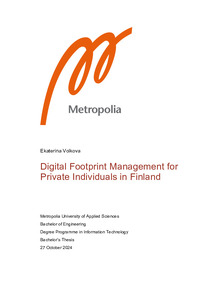Digital Footprint Management for Private Individuals in Finland
Volkova, Ekaterina (2024)
Volkova, Ekaterina
2024
All rights reserved. This publication is copyrighted. You may download, display and print it for Your own personal use. Commercial use is prohibited.
Julkaisun pysyvä osoite on
https://urn.fi/URN:NBN:fi:amk-2024112129161
https://urn.fi/URN:NBN:fi:amk-2024112129161
Tiivistelmä
The objective of the study was to examine data collection in Finland, assess
upcoming risks, and examine tools to limit third-party data collection, with a focus on blockchain technology for managing digital footprints. The study was carried out in the interest of private individuals who are concerned about the personal data collected. The starting point for the study was the increasing concern over data privacy on the Internet, particularly in Finland, where data collection practices are becoming more prevalent and sophisticated.
This study is based on secondary and primary research. Secondary research reviewed the literature on data collection in Finland, focusing on privacy risks. Primary research involved practical tests using blockchain platforms, like Hyperledger Indy, to evaluate the effectiveness of those platforms in managing digital footprints. The study combined theory with hands-on simulations to explore how blockchain can limit third-party access to personal data.
The study found that fully deleting a digital footprint is nearly impossible due to data duplication. Therefore, the focus shifted to limiting future data sharing. Blockchain technology, with its decentralized structure, emerged as a promising solution for secure data management without exposing personal information. While data on a blockchain cannot be deleted, it effectively reduces the risks of identity theft and unauthorized data access, making it a viable tool for digital privacy management.
The thesis helps privacy-conscious individuals manage digital footprints by
highlighting blockchain’s potential for secure information management. Blockchain’s decentralized structure reduces the risks of identity theft and unauthorized information access. This study lays a strong foundation for advancing digital privacy and secure identity management.
upcoming risks, and examine tools to limit third-party data collection, with a focus on blockchain technology for managing digital footprints. The study was carried out in the interest of private individuals who are concerned about the personal data collected. The starting point for the study was the increasing concern over data privacy on the Internet, particularly in Finland, where data collection practices are becoming more prevalent and sophisticated.
This study is based on secondary and primary research. Secondary research reviewed the literature on data collection in Finland, focusing on privacy risks. Primary research involved practical tests using blockchain platforms, like Hyperledger Indy, to evaluate the effectiveness of those platforms in managing digital footprints. The study combined theory with hands-on simulations to explore how blockchain can limit third-party access to personal data.
The study found that fully deleting a digital footprint is nearly impossible due to data duplication. Therefore, the focus shifted to limiting future data sharing. Blockchain technology, with its decentralized structure, emerged as a promising solution for secure data management without exposing personal information. While data on a blockchain cannot be deleted, it effectively reduces the risks of identity theft and unauthorized data access, making it a viable tool for digital privacy management.
The thesis helps privacy-conscious individuals manage digital footprints by
highlighting blockchain’s potential for secure information management. Blockchain’s decentralized structure reduces the risks of identity theft and unauthorized information access. This study lays a strong foundation for advancing digital privacy and secure identity management.
